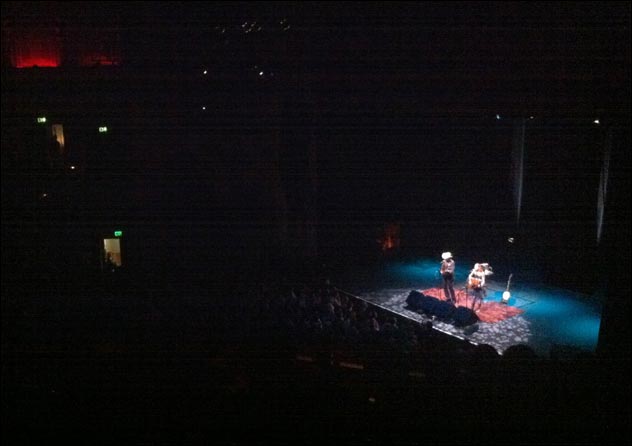
“Howdy,” said Gillian Welch, on stage at the Warfield.
It was after the first song of the set, “Scarlet Town,” which is also the first song on Welch’s new album, The Harrow and the Harvest. Welch and her partner David Rawlings were already tuning. Welch was making small talk; “Howdy” is just the normal, traditional thing for a girl who plays in a dress and cowboy boots to say.
But Welch kept talking. “Someone gave me shit the other day for saying ‘Howdy,'” she added. “What the fuck?!”
She plastered on her best glazed-over Michele Bachmann look and waved an exaggerated, role-playing wave.
“Hiiiiiiiiiiiiiiiiiiiii!,” she intoned, and kept up the sarcasm: “That’s more colorful.”
It was a moment that underlined Welch’s individuality perfectly. You’d never hear Alison Krauss start her show with the same banter, just like you’d never come across anyone else capable of crafting songs like “Time (The Revelator),” “I Dream a Highway” or “Everything is Free.”
Yes, all of those songs are from the same album, which was released ten years ago: Time (The Revelator), a completely flawless record that, even had it not been released in the great O Brother bluegrass frenzy of 2001, would still be widely recognized as a masterwork. Much of the album’s strength lies in its variety. It contains the Roy Orbison-like compactness of “Dear Someone”; the Steve Miller quote in “My First Lover”; the dueling death ballads “April the 14th, Part I” and “Ruiniation Day, Part II”; and “Elvis Presley Blues,” which is not a blues song.
At the Warfield, Welch played four songs from Time (The Revelator), but mostly the set culled from her newest record. Unfortunately, The Harrow and the Harvest falls back on recycling folk idioms rather than creating new forms, as Welch has proved herself more than capable of doing. Only briefly is it touched with the same presence from her two previous records—on the second and third songs, “Dark Turn of Mind” and “The Way it Will Be.” The rest sounds like Welch had writer’s block for eight years and got tired of everyone asking her where her new album was and decided, the hell with it, I’ll just let those ten years of playing the Hardly Strictly Bluegrass Festival work their influence and bang out some traditional songs that sound like everyone else, using my expansive knowledge of Southern lyrical themes to twist slightly, ’cause that’s what folk music has always done anyway, right? I’ll even throw in a hambone for Doc Watson’s sake.
This sounds harsh, and maybe it is. Except it’s also exactly what Welch herself is admitting to people in interviews. She’s just not being critical of herself for it, and why should she? That’s not her job, and taken out of context from the rest of her work, The Harrow and the Harvest is a perfectly respectable record. Gillian’s singing has always been amazing with Rawlings’, and Rawlings’ guitar playing is the stuff Sunday worship is made of. But the record is missing that songwriting je ne sais quoi, where the Gods hand down a song and say, “It’s yours now,” and it’s like the song wasn’t written with effort so much as delivered with the artist as a conduit for something greater.
Luckily, on stage, even if they were forced to play the Thank God It’s Friday soundtrack, Welch and Rawlings possess a cosmic togetherness. So it was easy to forget the debt owed to early Appalachian folk songs, even as Welch sang about hard times and drinking whiskey when she’s dry and standing in the backdoor crying and being down along the Dixie line. Of all the descriptors of their stage presence, “alchemy” is the most fitting. You could throw in “ESP,” “galaxian-like prowess” and “unfuckwithable” if you wanted, too.
For some of the songs being played live for the first time ever—the Warfield show kicked off her tour—they already sounded completely polished. Welch played two songs from Soul Journey, “Look at Miss Ohio” and “No One Knows My Name,” and her cover choice reflected a traditional bent, too: “I’ll Fly Away,” popularized from the O Brother soundtrack. (This is probably her best cover ever.) She joked that she’d been to the Warfield a bunch but had never been on stage, and when an audience member asked who she saw, she listed off Tom Waits, Jerry Garcia’s acoustic shows, and the Pixies.
And even though almost none of those influences played out on stage, a Gillian Welch show is always a special thing. When the two-hour night closed after two encores with “That’s the Way the Whole Thing Ends”—the last song, too, from The Harrow and the Harvest—it was pretty evident that no one in the theater wanted the show to stop.
Live Review: Gillian Welch at the Warfield









